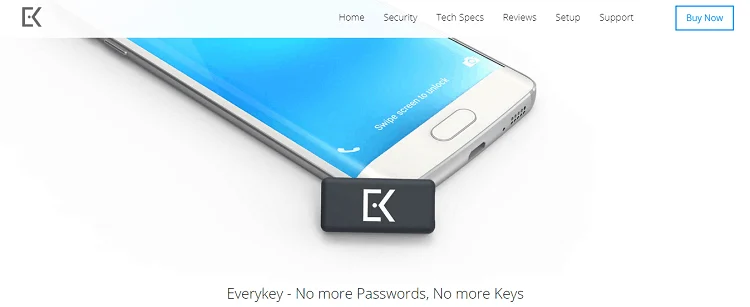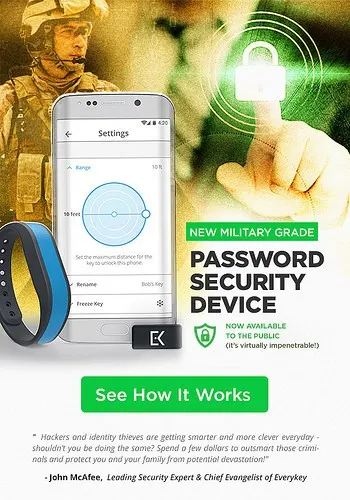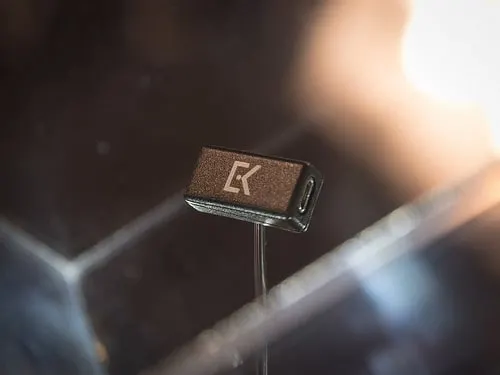The future is now, and the combination of modern technology and truly innovative minds have created some products that seem like they belong in a science fiction thriller – but they exist in real life!
No, unfortunately, I’m not talking about a real hoverboard, but modern innovation has developed a product that seeks to change something that hasn’t been changed for hundreds of years: keys.

EverKey is a product with a simple motto: no more passwords, no more keys. And this cutting-edge device acts a physical key that can be paired with Bluetooth devices to automatically unlock your accounts for your convenience.
But is it safe and secure? Is it affordable? Or is this just another gimmick that won’t last until year’s end? I’ll help you answer those questions and more, starting with the pricing model.
Price
While it’s true that EverKey uses some really cool technology, given that it’s a Bluetooth device, I had expected it to be a lot more affordable. EverKey ain’t cheap, in my opinion, given that it acts as a password manager and physical key replacement.
However, I suppose the high price could be justified if you’re using it to unlock things like your vehicle. Still, physical keys are a lot cheaper than EverKey.
The following outlines the pricing model:
- One EverKey – $128.00 and free US shipping (check this listing for the latest live prices)
- Two EverKeys – $115.00 per key ($230.00) and free US shipping (check this listing for the latest live prices)
- Four EverKeys – $109.00 per key ($436.00) and free US shipping (check this listing for the latest live prices)
I suppose that it’s nice that you can save some money when you buy more than one at a time. But there aren’t large packages that make it a viable option for professional environments or large families. I suppose you could buy it for those use cases, but the savings wouldn’t be phenomenal.
Still, you can save a significant amount of money.
Features
On the surface, the concept of EverKey is pretty simple. In short, it is designed to act as a technological key that can unlock and grant access to the following objects:
- Car
- Phone
- Laptop
- House/physical doors
- Website accounts
This certainly isn’t an exhaustive list, either, and it seems that its uses are limited only by the imagination. But what is EverKey, exactly? How does it work, and what other features does it have?
First off, you should know that EverKey is physically nothing more than a device that looks like a small flash drive, and uses Bluetooth technology to facilitate its key features.
By pairing the Bluetooth device with a Bluetooth enabled device, EverKey will assume the role of a real physical, and grant access by enabling the device. But note that EverKey doesn’t store your data on the EverKey device.
Instead, it is stored on the device. For instance, if you used it to unlock user accounts in your browser, note that the login credentials would be stored on your computer, and not on the EverKey device.
This is a necessary design quality that prevents hackers from physically stealing your EverKey device and hacking into it to steal account passwords. Also, note that it’s compatible with the following platforms:
- Windows
- Mac
- Android
- iOS
- Ubuntu
- Chrome
- Firefox
- Safari
- Opera
- Internet Explorer
They also have wristband and keychain accessories so that you can keep your EverKey anchored to your person at all times, which drastically reduces the chances of it becoming lost or stolen, as well as a Bluetooth dongle and charging cable.
Security
Most people have their fair share of security concerns, especially if they don’t have a background in IT or strong computer literacy skills. However, note that EverKey has spent a lot of time and energy in making its product secure. I personally have my own security concerns, but we’ll get to those in a minute.
Firstly, you should know that EverKey uses military-grade encryption to secure your account and key data, so it can’t be read if it is captured by a third party. It uses AES-128-bit encryption, which is still unbreakable with today’s most powerful computers.
I do wish that it had used AES-256-bit encryption because the keys would then be 256 bits long instead of 128 bits long, which exponentially increases security.
Still, AES-128 is still acceptable, secure, and unable to be cracked using a brute force attack. Plus, it uses an algorithm that constantly changes the security key for broadcast Bluetooth messages, so that hackers can’t mimic or spoof the identity of your EverKey.
And lastly, there is a freeze feature that’s applicable to lost or stolen keys. You can activate the freeze feature through the EverKey app, which will disable your missing EverKey. When and if the key is found, you can once again enable the key by unfreezing it.
In summary, the following outline EverKey’s security features:
- AES-128-bit encryption (military-grade)
- Protected passwords that aren’t stored on the EverKey device
- EverKey (the company) can’t access or decrypt your passwords since they aren’t stored on EverKey products or servers
- Spoof prevention
- Audited by an independent third-party organization, called SecureState
- Freeze feature for lost or stolen keys
Security Concerns
When I first heard about this product, I was incredibly skeptical. And to some degree, I am still a little wary, since it is a new product. It takes a lot of time for new products to mature, especially in the world of software.
Just look at any new Microsoft operating system, which is loaded with bugs when it first comes out and slowly becomes more stable and secure as time marches forward.
I was, however, immensely impressed with all the security features that were included. I think that the developers of this product did a great job in seeing around corners to nullify any qualms that their user might have about using a digital key. But even so, I do have concerns.
Even though it isn’t possible to steal login credentials from the device itself (since passwords aren’t stored on the device), my biggest concern is copying the key.
There is no such thing as a perfect computer system or an infallible piece of code, and if hackers have the time, drive, money, and technology, it is said that nothing is safe.
There is an anti-spoofing function, but what if someone was able to steal your device, copy it verbatim using hitherto unknown methods, and then slip your key back in your possession without your knowledge?
Could a hacker create a virus that infects the key, and hijacks sessions that are unlocked with it? I don’t have answers to these questions, though you can bet that there are some flaws in the system. If there weren’t any flaws, they wouldn’t ever need to patch or upgrade the algorithm, which you can bet big money they will.
So despite all of the security features, which are awesome and well thought out, I still have reservations.
Final Thoughts
I think this is a really cool product, and I hope that it really takes off. It seems that more and more devices are becoming Bluetooth enabled, and all sorts of devices (some of them are unassuming and strange) are getting wired up to the Internet.
For instance, refrigerators, cooking equipment that uses RTP (Real Time Protocol), cars, and other devices are waking up and coming online as we move towards an era of the Internet known as the Internet of Things (IoT).
For those reasons, I see a lot of value in this product, especially as the future unfolds. However, at this point in time, I would only personally use it on my computer.
And for that, I already use a password manager. If I had locks and cars that are able to connect to a Bluetooth device, I would be a lot more excited about this product.




